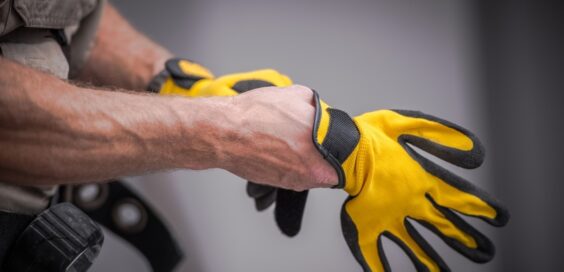Work Gloves: Why They Need To Fit Your Hands Properly
Written by SayBuild-admin // October 22, 2025 // Construction Equipment // Comments Off on Work Gloves: Why They Need To Fit Your Hands Properly

Your hands take a beating during construction projects. Whether you’re framing a house, installing drywall, or handling rough lumber, poorly fitting work gloves can turn a manageable job into a painful experience. The right fit makes all the difference between completing your project safely and dealing with blisters, cuts, or worse.
Most people grab the first pair of work gloves they see at the hardware store without considering proper fit. This approach costs you comfort, safety, and money in the long run. Read on as we discuss why work gloves need to fit your hands properly and what happens when they don’t.
Poorly Fitting Gloves Create Safety Hazards
Loose gloves slip and slide on your hands, reducing your grip strength when you need it most. You lose control of tools, lumber, and materials. This poor control leads to accidents, dropped objects, and potential injuries to yourself and others on the job site.
Tight gloves restrict blood flow and cause hand fatigue much faster than properly fitted ones. Your hands cramp up, forcing you to take more breaks and slowing down your progress. Over time, this restriction can lead to nerve compression and long-term hand problems.
The Right Fit Improves Your Performance
Well-fitted work gloves move with your hands naturally. You maintain full dexterity while still getting the protection you need. This means you can:
- Handle small fasteners and hardware without removing your gloves
- Maintain a secure grip on tools and materials
- Work longer without hand fatigue
- Feel confident in your movements and control
When your gloves fit properly, you essentially forget you’re wearing them. This comfort allows you to focus on the task at hand instead of constantly adjusting your protective gear.
How To Find Your Perfect Glove Size
Start by measuring your hand properly. Use a flexible measuring tape to measure around the widest part of your palm, excluding your thumb. This measurement in inches typically corresponds to your glove size.
Try gloves on before you buy them when possible. Your fingers should reach the end of each glove finger without excess material bunching up. The palm should feel snug but not restrictive. You should be able to make a fist comfortably without the material pulling tight across your knuckles.
Different glove materials fit differently. Leather stretches and conforms to your hand shape over time, while synthetic materials maintain their original fit. Quality leather work gloves in Texas and other hot climates need extra consideration since heat can affect how materials feel and perform.
Material Matters for Comfort and Durability
Leather gloves offer excellent durability and improve with use as they conform to your hands. They breathe better than synthetic options, making them ideal for extended wear during long construction days.
Synthetic gloves often provide better initial fit consistency but don’t adapt to your hand shape over time. They typically cost less but may need replacement more frequently.
Signs Your Current Gloves Don’t Fit Right
Pay attention to these warning signs that indicate your work gloves need replacing:
- Blisters or hot spots developing on your hands
- Difficulty gripping tools securely
- Hand fatigue setting in quickly
- Gloves sliding around during use
- Fingertips going numb during work
Invest in Quality for Long-Term Value
Cheap, ill-fitting gloves cost more in the long run. You replace them frequently, deal with reduced productivity, and risk injury from poor protection. Quality work gloves that fit properly last longer, perform better, and keep your hands safer.
Consider buying multiple pairs of properly fitting gloves for different tasks. Heavy-duty leather for rough work, lighter options for detail work, and weather-specific gloves for outdoor projects in various conditions.
Image Credentials: by Tomasz Zajda








 If you want to contribute tutorials, news or other money-related stuff:
If you want to contribute tutorials, news or other money-related stuff:  Share our home building library with your facebook friends:
Share our home building library with your facebook friends:  Do you have any ideas or suggestions you would like to make?
Do you have any ideas or suggestions you would like to make?  If you like what we do, please subscribe to our
If you like what we do, please subscribe to our  All content Copyright © 2012 SayBuild. Part of nBuy Home Management Network.
All content Copyright © 2012 SayBuild. Part of nBuy Home Management Network.